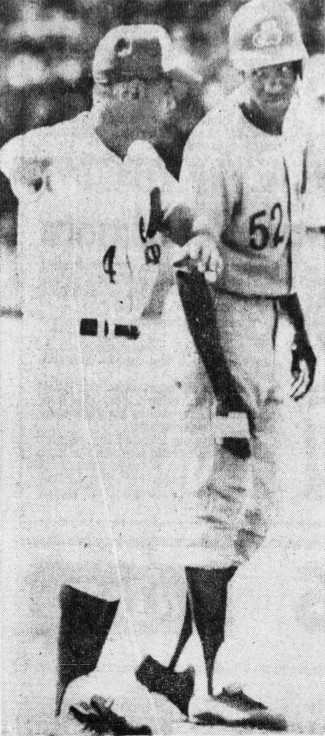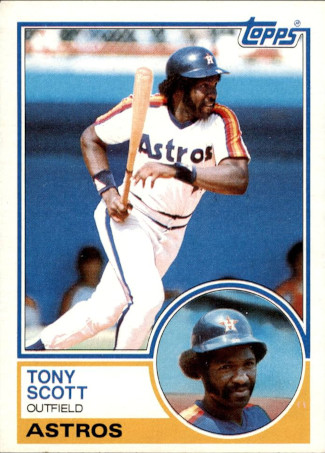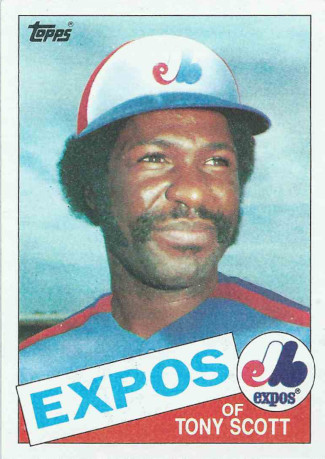RIP to outfielder Tony Scott, who spent parts of 11 seasons in the majors in the 1970s and ’80s. Scott, who spent his entire playing career in the National League, died on May 26 at the age of 72. Scott played for the Montreal Expos (1973-75. 1984), St. Louis Cardinals (1977-81) and Houston Astros (1981-84).
Anthony Scott was born in Cincinnati on September 18, 1951. He was the second-youngest child in a family with nine children — six boys and three girls. Scott’s father died when he was still in school, and his mother Thealo worked hard to support her large family as best as she could. Scott did his part by delivering newspapers, and he later joked that he developed his strong throwing arm by throwing copies of the Cincinnati Enquirer on neighborhood doorsteps. As a student-athlete at Witherow High School, he wasn’t the biggest ballplayer — he weighed 160 pounds and stood 5’10”, reaching an eventual height of 6′ — but he was one of the best hitters. He batted .350 in his senior season (the only year he was on the varsity team) and was drafted in the 71st Round of the 1969 June Amateur Draft by the Montreal Expos. The Expos and the Kansas City Royals, both of which began play in ’69, were the only two teams still drafting at that point, as they needed to stock their minor-league organizations. Scott was the 1,019th of 1,044 players picked in the draft, and only one player drafted after him, Al Cowens (#1028), reached the majors. Scott was signed by Expos scout Terry Boyle and joined Bradenton of the Florida Gulf Coast League — a long shot to be sure.

Scott hit just .179 for Bradenton in his first taste of professional ball as a talented but unpolished rookie, but he hit 10 home runs for Class-A Watertown in 1970 while stealing 13 bases. Scott batted .254 at two different Class-A stops in 1971, with 17 stolen bases and 16 doubles. After the season, he was added to the Expos’ big-league roster along with one of the few players drafted after him in 1969, future in-demand batting coach Rick Down. Of the rookies added to the roster, Scott seemed to be the one who made the best impression on general manager Jim Fanning. “He can run, throw, field and hit,” Fanning said. When spring training rolled around in 1972, Scott impressed manager Gene Mauch as well, even though he didn’t make the team. “That fellow will be a major leaguer, I have no doubt about that,” Mauch said of the young outfielder.
Scott spent all of 1972 and most of 1973 playing for the Quebec Carnavals of the Double-A Eastern League. He didn’t hit well in ’72, with a .214 batting average, but he stole 37 bases in 48 attempts and continued to improve his defense in the outfield. He hit better in 1973, with 5 homers, 12 stolen bases and a .256 batting average, and the Expos promoted him to the majors in September. Montreal was still within striking distance of first place in the NL East, and there wasn’t much room for Scott to play regularly. The team’s corner outfielders, Ron Fairly and Ken Singleton, were too valuable to remove, and many of the spot starts went to the recently acquired Felipe Alou. The speedy Scott was left to serve as either a pinch-runner or a late-inning defensive replacement. His major-league debut came as a pinch-runner on September 1, 1973, when starting pitcher Balor Moore was hit by a pitch from Philadelphia’s Wayne Twitchell and had to leave the game. Scott promptly scored on a 2-run homer by Mike Jorgensen. On September 17, Scott pinch-ran for Jim Lytle in the ninth inning of a game between the Expos and Cardinals. He advanced to second base on an Al Hrabosky wild pitch and scored on an Alou single, slamming into Cardinals catcher Ted Simmons to tie the game at 3. Montreal won the game one batter later. Scott appeared in 11 games and scored 2 runs for the Expos, but he had just one at-bat, striking out at a pinch-hitter against St. Louis’ Reggie Cleveland the day after his collision with Simmons.

Scott’s 1974 season went much the same way. He hit .284 for Quebec with 43 stolen bases and joined Montreal in September. This year, he was given a chance to pinch-hit right away, on September 3, and he singled off the Cardinals’ Lynn McGlothen for his first major-league hit. He carried that 1.000 career batting average for a couple of weeks until he got another at-bat on September 14th against Pittsburgh. He grounded out to ruin his perfect batting record, but he picked up his first career RBI with the out. Scott played in 8 games and had 2 hits in 7 at-bats for a .286 batting average. He also picked up his first major-league walk and stolen base.
Scott stayed with the Expos for the entire 1975 season, thanks in part to a strong performance in spring training. He had learned to be a switch-hitter in the minor leagues to make him more valuable, but Mauch never quite bought into his abilities. “I don’t think he’s strong enough right-handed to do it,” he said of Scott’s switch-hitting. The funny thing was that Scott was a natural right-handed hitter and had to learn to hit as a lefty. “We were all right-handed and we’re all better hitters now from the left,” Scott said of the small group of players, including Jerry White and Larry Lintz, who were taught the skill. Even with the coaching, Scott said he didn’t become a truly good hitter until he started taking his own advice. “I changed my batting style the last couple of years. I stopped all that experimenting and started hitting the ball where it’s pitched,” he said. “If I hit it to shortstop, then I’d try to beat it out.”
Scott was the leadoff hitter in Montreal’s Opening Day win over St. Louis on April 7, 1975. He contributed to the 8-4 win with a 2-run double off Bob Gibson. He started regularly for much of the season, playing the corner outfield spots and occasionally center field. He struggled to keep his batting average above .200, and after hitting a triple off Cardinals pitcher Bob Forsch on July 5, his average was .210. He didn’t get another hit for the rest of the season. Relegated to a bench role for the rest of the year, Scott played in 34 more games and was 0-for-19 to end the year with a .182/.258/.238 slash line and a .496 OPS. It was his final season in Montreal. Scott spent all of 1976 playing in Triple-A Denver, with a .311 batting mark and a .503 slugging percentage thanks to 21 doubles and 8 home runs. Scott’s manager in Denver was Vern Rapp, who was named the Cardinals manager for 1977. He then suggested that his new team try to acquire Scott. In November 1976, Scott, Steve Dunning and Pat Scanlon were traded to St. Louis for Bill Greif, Sam Mejias and Angel Torres.

The St. Louis Cardinals played in Cincinnati on May 4, 1977, and Scott left passes for his entire family, including his mother. It was just the second time Thealo Scott had seen her son play baseball. “She never followed baseball,” Scott explained. “She stayed in the church.” The family was treated to a show, as Scott hit his first career home run off Reds’ starter Woodie Fryman in an 8-1 win. By that point in the season, Scott had played his way into the starting lineup as the everyday center fielder, displacing Bake McBride in the process. Scott had started the year as a backup outfielder but hit .357 in the month of April. He didn’t slow down once the starting job was his, either. He didn’t have much power, and he stole just 13 bases in 23 attempts, but before his season ended in August with knee surgery, Scott slashed .291/.368/.397 with an OPS of .765.
Once he recovered from the surgery, Scott was projected in 1978 to be a part of a “4-man” outfield, where he would find time along with Lou Brock, Jerry Mumphrey and Jerry Morales. His knee was better, but his hitting was poor, and he hit .228 in 96 games and stole only 5 bases in 11 tries. He was fully recovered by 1979 and took over the center field role. Scott played in a career-high 153 games that year and slashed .259/.301/.361. He led the Cardinals with 37 stolen bases and hit career highs in all extra-base hit categories, with 22 doubles, 10 triples and 6 home runs. Despite a lengthy 0-for-37 slump in May, manager Ken Boyer’s faith in Scott didn’t waver. “You know last winter at all the banquets, everybody was asking me about our outfield, and I told everybody that I had a sneaking suspicion that Tony Scott was going to be one of the people out there,” he said. “”Nobody was talking about him.”
Scott slumped in 1980, hitting .251 with a .311 slugging percentage. He was one of the best defensive outfielders in the National League, commiting just one error in center field for a .997 fielding percentage. Against Cincinnati pitching, he was a superstar, with a .571 batting average against his hometown team. “I like playing against them. Maybe it’s because they televise the games back home,” he theorized. While Scott played steady ball, the Cardinals organization was in a state of transition. Whitey Herzog took over the managerial reins partway through the 1980 season and then quickly assumed the role of general manager. He began making deals to rebuild the team, acquiring the highly touted prospect David Green from Milwaukee. It put the pressure on Scott. “Tony is my center fielder. There’s none better,” Herzog said early in the 1981 season. “He has to hit, though. Otherwise I’ll try somebody else.”

Scott tried his best. “I know I can hit. I can hit better than .250,” he said. “I have the speed, too. No matter how much contact you make, it’s a matter of the ball falling in. Sometimes it won’t.” It proved to be the case for Scott in 1981. He struggled to a .227 average with St. Louis in his first 45 games, and then he was traded to Houston on June 7 for pitcher Joaquin Andujar. Scott got 4 hits in his first 3 games as an Astro, but then the players’ strike wiped out the next two months. Once play resumed in August, Scott was one of Houston’s hottest hitters, batting .293 and taking over in center field from Cesar Cedeno. Houston finished in first place for the second half of the season, getting into the playoffs. The team lost to Los Angeles in the NL Division Series, and Scott was 3-for-20 with 2 RBIs in Houston’s 5-game loss.
Scott became a free agent after the season and signed a three-year, $1.25 million contract with Houston. He remained a starter in 1982, hitting .239 in 132 games. Never a particularly patient hitter, Scott was more reluctant to draw a walk than usual, and his 15 bases on balls left him with a .263 on-base percentage. With Jose Cruz and Terry Puhl manning the corner outfield spots, center field was the only question mark in Houston’s outfield. The team tried to fill the starter’s role with Omar Moreno in 1983 and Mumphrey in 1984, and Scott was moved to the role of backup outfielder and pinch-hitter. He batted .226 in 1983 and then .190 for the Astros in ’84. Houston released him on June 22, 1984, after playing in 25 games. Ten days later, he re-signed with his old team, the Montreal Expos. Montreal’s manager Bill Virdon, who was Scott’s manager in Houston in 1981, immediately put his new outfielder into the lineup to rest Andre Dawson’s aching knees. In Scott’s first game, he doubled twice and drove in the winning run in a 7-3 win over Cincinnati. “It’s great to be given the confidence,” Scott said. “I wasn’t getting the chance to play at Houston.” It also happened to be the game in which Expos first baseman Pete Rose broke Carl Yastrzemski’s all-time record by playing in his 3,309th major-league game. Scott played in 45 games for Montreal as a pinch-hitter and backup outfielder and hit .254. He was placed on waivers after the season and did not play again.

Scott played in the majors for parts of 11 seasons and slashed .249/.297/.327, for a .625 OPS. His 699 career hits included 11 doubles, 28 triples and 17 doubles. Scott drove in 253 runs, stole 125 bases while getting caught 69 times and scored 331 runs. He was an above-average defender in both center field and left field, and he had a .987 fielding percentage as a canter fielder.
Scott didn’t stray too far from baseball after retiring as an active player. He joined the Senior Professional Baseball Association as an outfielder for the Winter Haven Super Sox and then was a long-time coach in the Philadelphia Phillies organization. His time with the Phillies started in 1989 as a minor-league coach and included a stint on the team’s major-league coaching staff from 2001-03.
For more information: MLB.com
Follow me on Instagram: @rip_mlb
Follow me on Facebook: ripbaseball
Follow me on Bluesky: @ripmlb
Follow me on Threads: @rip_mlb
Follow me on X: @rip_mlb
Support RIP Baseball




One thought on “Obituary: Tony Scott (1951-2024)”